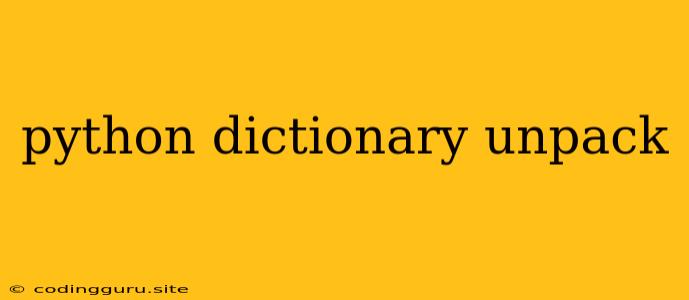Unpacking Python Dictionaries: A Comprehensive Guide
Python dictionaries are powerful data structures that allow you to store and access data in a key-value format. Unpacking dictionaries is a convenient and efficient way to extract data from these structures. In this article, we'll explore various methods for unpacking Python dictionaries, delving into their nuances and practical applications.
What is Dictionary Unpacking?
Dictionary unpacking refers to the process of extracting individual key-value pairs from a dictionary and assigning them to variables. This technique provides a concise and readable way to work with dictionary data. Let's delve into the different approaches available.
1. Using the * operator with items():
The items() method returns a view of the dictionary's key-value pairs. This view can be unpacked using the * operator. This approach is suitable when you want to access all the key-value pairs individually.
Example:
my_dict = {"name": "Alice", "age": 30, "city": "New York"}
# Unpacking all key-value pairs
key1, value1, key2, value2, key3, value3 = *my_dict.items()
print(f"Key 1: {key1}, Value 1: {value1}")
print(f"Key 2: {key2}, Value 2: {value2}")
print(f"Key 3: {key3}, Value 3: {value3}")
Output:
Key 1: name, Value 1: Alice
Key 2: age, Value 2: 30
Key 3: city, Value 3: New York
Key Points:
- The order of the key-value pairs extracted may vary depending on the Python version and dictionary implementation.
- This method requires knowing the exact number of key-value pairs in advance for successful unpacking.
2. Unpacking with Direct Assignment:
You can directly unpack key-value pairs from a dictionary into variables with corresponding names.
Example:
my_dict = {"name": "Bob", "age": 25, "city": "London"}
name, age, city = my_dict["name"], my_dict["age"], my_dict["city"]
print(f"Name: {name}, Age: {age}, City: {city}")
Output:
Name: Bob, Age: 25, City: London
Key Points:
- This approach is suitable when you need to access specific key-value pairs by their names.
- Ensure that the variable names match the dictionary keys for correct assignment.
3. Unpacking with ** (Double Asterisk) Operator:
The ** operator allows you to unpack dictionary elements into keyword arguments for function calls or other dictionaries.
Example:
def greet(name, age, city):
print(f"Hello, {name}! You are {age} years old and live in {city}.")
my_dict = {"name": "Charlie", "age": 35, "city": "Paris"}
greet(**my_dict)
Output:
Hello, Charlie! You are 35 years old and live in Paris.
Key Points:
- This method is particularly useful when passing multiple arguments from a dictionary to a function.
- The
**operator is essential for dynamically supplying keyword arguments based on dictionary content.
4. Unpacking using get() Method:
The get() method provides a safer way to unpack dictionary values, as it allows you to specify a default value if the key is not found.
Example:
my_dict = {"name": "David", "age": 40}
name = my_dict.get("name", "Unknown")
age = my_dict.get("age", 0)
city = my_dict.get("city", "N/A")
print(f"Name: {name}, Age: {age}, City: {city}")
Output:
Name: David, Age: 40, City: N/A
Key Points:
- This approach prevents
KeyErrorexceptions when attempting to access keys that might not exist in the dictionary. - Using
get()with a default value provides better error handling and code robustness.
5. Unpacking with pop() Method:
The pop() method removes a specific key-value pair from the dictionary while simultaneously returning its value.
Example:
my_dict = {"name": "Emily", "age": 28, "city": "Sydney"}
name = my_dict.pop("name")
age = my_dict.pop("age")
print(f"Name: {name}, Age: {age}")
print(f"Updated dictionary: {my_dict}")
Output:
Name: Emily, Age: 28
Updated dictionary: {'city': 'Sydney'}
Key Points:
- This method is useful when you need to unpack values while modifying the dictionary.
- Be cautious as
pop()permanently removes the key-value pair from the dictionary.
Conclusion
Unpacking Python dictionaries is a versatile technique that allows you to work with dictionary data in a more structured and efficient way. We've explored five different methods, each with its advantages and use cases. By understanding these techniques, you can choose the most appropriate approach based on your specific needs and coding style.
